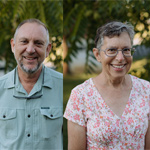
Walking with USA Ministries: How to recover from an aversion to evangelism
by Skip and Carol Tobin
Skip Tobin is USA Ministries Director, and Carol Tobin is Asia Regional Director & Mission Advocate for VMMissions
“My name is Skip. I am here because I want to recover from an aversion to evangelism.”
This wasn’t just a catchy line to begin a workshop entitled “Evangelism Aversion Recovery.” It was an admission that during this last season of life as VMMissions staff persons, both of us have had to work hard at regaining the passion and confidence we have had for sharing the gospel, a passion we have enjoyed at other times and places in our lives. It was an invitation to workshop participants to realize that something is desperately wrong when we encounter resistance within ourselves to sharing the news that has been transforming the lives of individuals and communities in beautiful ways for 2,000 years.
The topic seemed timely for us as members of Virginia Mennonite Conference. After all, how do we “restructure for mission” unless we reconnect with an enthusiasm for the good news that is at the heart of God’s mission? And how do we live the assembly theme—God’s Kingdom: The 3D Experience—unless we live into the three dimensions of Jesus’ life and priorities: his worshipful relationship with his Father (UP), his close relationship with his disciples (IN) and his active compassionate engagement with the lost (OUT).
The fact is, the number of people in our communities who are totally biblically illiterate is increasing rapidly. We are failing to pass on our faith.
Several months earlier, leaders from New York Mennonite Conference had asked us to spend a weekend helping to equip them for “mission across the street.” In our final session, as we reviewed what God had done, several leaders noted remorsefully that they recognized an inner discrepancy: on the one hand a growing desire to share what is clearly life-giving, and on the other hand a deep rooted, long-ignored resistance.
It took the whole weekend to begin to admit that deeply entrenched negative attitudes and excuses are not consistent with the life of a disciple of Jesus.
We asked the folks who attended our assembly workshop in Hampton why they had come. Several were quick to own that the very word “evangelism” left a bad taste in their mouths, that they found clichés and overly simplistic gospel formulas distinctly distasteful. Others noted that it was something that they just never did, being fully occupied with “church activities” and having little time or energy left for authentic connections with non-believers. We all admitted that it is challenging to know what to say and that we recoil from examples of insensitivity and overbearing arrogance that are out of character for God as revealed in Jesus.
Participants expressed specific appreciation for the things that we commended to them, all aimed at helping us to reimagine the beauty of partnership with the Holy Spirit in gospel witness.
Carol challenged participants to apply themselves to the significant work of articulating a biblically-faithful gospel to the people in our lives who would be blessed to hear it, to work at ridding ourselves of clichés and to speak what rings true in our own hearts and experience, and to treasure what is still an unfolding mystery.
Darrell Wenger, from Zion Mennonite Church, told us at the conclusion of the workshop that he felt encouraged to take up that challenge.
We enjoyed sharing what we call LASI: It is only after we Listen well that we can Affirm what we hold in common with one another, which then leads to being able to Share what is true in our own experience. Finally, we Invite God into the conversation – asking him to do what we can’t do, in making himself known.
Given the many opportunities that Maren Hange, in her pastoral ministry at Charlottesville Mennonite Church, is having to listen to the members of her broader community in the wake of the violence earlier this year, she was grateful for our emphasis on listening as the first and fundamental task of engaging with others.
Jennifer Davis Sensenig, pastor of Community Mennonite Church, was grateful for a simple format to use in sharing with others what God has done in our lives. We recommended, and practiced, this format:
1. Identify a legitimate human need that was or is predominant in our life and which serves to motivate us. (examples: love and belonging, approval, meaning, beauty, etc.)
2. Share about the despair, the sin, and shame that occurred/occurs when we try to pursue that need apart from God.
3. Describe how God rescued or continues to rescue us, offering us what we need in the context of a relationship with him.
Was there more to cover? Yes, a lot more! Would we like to offer more such opportunities? Certainly. Please be in touch if, like us, you could benefit by some recovery.
